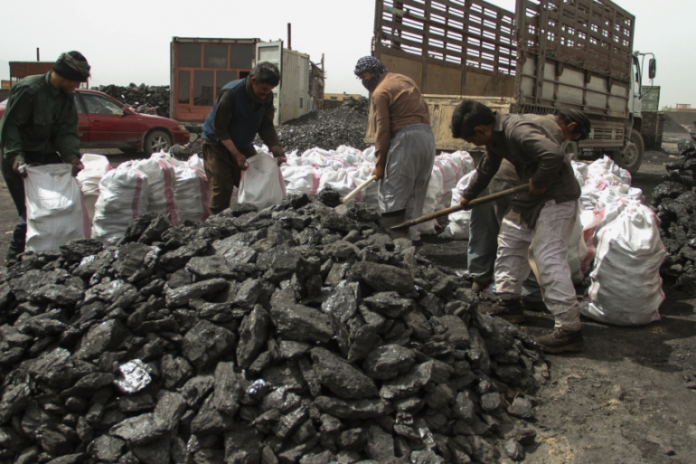Yakawlang, Afghanistan — Fighting has been going on for the past several weeks in the remote Balkhab district of Afghanistan’s northern Sar-e-Pol province, part of a demonstration between the Taliban-run cash-strapped central government and locals who want to keep are trying. The district’s own deduction of funds. At the center of the controversy is a fight over the coal mines, and who benefits from them by trapping local residents in the middle.
Since the Taliban’s takeover of Afghanistan last August, which resulted in international sanctions and freezing of funds, the group has been in dire need of money, and resources in Balkhab are providing just that. According to the Ministry of Mines and Petroleum Spokesperson Mufti Esmatullah Burhan, as well as one of the world’s largest copper deposits, the district is home to five ongoing coal mines.
Coal extraction had been in progress for a long time, but began to accelerate three months ago, with dozens of heavy-loaded trucks heading eastward to Pakistan each day through rough mountainous terrain to Kabul, where Most of the coal is sold. Afghan coal exports to its neighbor have increased since Indonesia, a major exporter of a type of thermal coal used in power plants, imposed export restrictions earlier this year due to lack of domestic supplies. Even after Indonesia eased its export restrictions, Afghan coal has remained attractive to Pakistan due to skyrocketing fuel prices and long distances from other potential suppliers.
Yakawlang, Afghanistan — Fighting has been going on for the past several weeks in the remote Balkhab district of Afghanistan’s northern Sar-e-Pol province, part of a demonstration between the Taliban-run cash-strapped central government and locals who want to keep are trying. The district’s own deduction of funds. At the center of the controversy is a fight over the coal mines, and who benefits from them by trapping local residents in the middle.
Since the Taliban’s takeover of Afghanistan last August, which resulted in international sanctions and freezing of funds, the group has been in dire need of money, and resources in Balkhab are providing just that. According to the Ministry of Mines and Petroleum Spokesperson Mufti Esmatullah Burhan, as well as one of the world’s largest copper deposits, the district is home to five ongoing coal mines.
Coal extraction had been in progress for a long time, but began to accelerate three months ago, with dozens of heavy-loaded trucks heading eastward to Pakistan each day through rough mountainous terrain to Kabul, where Most of the coal is sold. Afghan coal exports to its neighbor have increased since Indonesia, a major exporter of a type of thermal coal used in power plants, imposed export restrictions earlier this year due to lack of domestic supplies. Even after Indonesia eased its export restrictions, Afghan coal has remained attractive to Pakistan due to skyrocketing fuel prices and long distances from other potential suppliers.
In the past, local electricity brokers found it easier to extract income from informal taxes than from the coal trade, but the Taliban’s government in Kabul has attempted to consolidate revenue, with all potential tax proceeds going directly to Kabul – much The dismay of some men like Mawlawi Mehdi.
Mehdi, a long-time troubleshooter in the district, joined the Taliban in 2019 after parting ways with local leaders of the previous government. He was appointed as shadow governor of Balkhab in 2020, before the Taliban took control of the district or the rest of the country, making headlines as an ethnic Hazara leader in a movement dominated by Pashtuns. At that time, he was considered a traitor among his own community; Balkhab has a sizable population of tens of thousands, who were the first to be victims of the Taliban’s powerful control of Afghanistan and who have been on the receiving end of violence and abuse this time. When the Taliban took power last year, he was essentially demoted to intelligence chief in neighboring Bamiyan province, yet remained in close contact with people in his home district. After several negotiation attempts, he was fired in April, and has since returned home to Balkhab, where he has gathered supporters fighting the Taliban over the past several weeks.
Mehdi’s dispute with the authorities is not new. Under the former government, and before joining the Taliban, he clashed with local officials over coal reserves and money he tried to extract, said Ibrahim Bahis, an Afghanistan analyst with the International Crisis Group.
“But now the Taliban is on an intense campaign to consolidate resources. As part of this, he removed taxation by local Taliban actors in order to centralize it. This is where the issues with Mehdi started,” said Bahis. “He wanted to continue operating under the insurgency model of taxing local resources.”
He said the Taliban had become vulnerable to any threat. “They focus on consolidating power by monopolizing resources, crushing perceived threats, and warding off future threats. When it comes to Balkhab, the group has made monopolizing resources a red line. .
What started as a brawl has spiraled out of control. The Taliban say they have control over Balkhab. Locals say the Taliban have deployed troops, searched homes and sent hundreds of civilians into the mountains to fight Mehdi and forces loyal to him. He says Taliban fighters in Balkhab show little respect for the local Hazara population. Many displaced people have since been trapped without food, water or shelter; Local media reported that at least four children died of starvation and exposure, while others were on the verge. Mehdi’s forces have carried out several attacks against the Taliban and casualties have been reported on both sides. Reports and videos surfacing on social media also show the Taliban attacking and killing civilians.
Patricia Gossman, Human said, “Reports of the executions of some civilians in Balkhab are extremely worrying because they are part of a pattern of the Taliban failing to differentiate between civilians and fighters or applying collective punishment in those areas. Where there has been armed resistance.” Rights Watch associate Asia director.
United Nations Assistance Mission in Afghanistan tweeted On 29 June it was concerned with “reports of civil damage, displacement, allegations of serious human rights violations and damage to property. [the] Recent outbreak of conflict in Balkhab district.
People living in villages in Bamiyan province said Taliban insurgents have begun to use local schools and homes as shelters for the night. On the way to collect coal in Balkhab, truck drivers sit by the roadside and wait for the fight to end.
“The main road to Balkhab is closed, and the only way out is through the mountains, but several people trying to leave Balkhab have been arrested by the Taliban,” a source said on condition of anonymity.
Coal truckers report that they are able to move sporadically. Some say they are afraid of fighting; Others brush it off—violence is nothing new in Afghanistan.
In Kabul’s Deh Sabz district, exactly 20 men sit in the shadows of two large trucks; They have all returned from Balkhab, saying the delays were due to road closures, checkpoints and slower tax processing than usual “due to conflict”. The queue of trucks carrying all kinds of goods in Deh Sabz is miles long, but only a few have arrived from Balkhab in recent times.
“For each [metric ton] We had to pay 1,500 afghani for coal [$17] For the Mehdi people, on top of the 3,600 Afghanis [$40] in taxes that the Ministry of Mines and Petroleum takes,” said 42-year-old coal trader Mohammad Yasin, holding a stamped tax slip obtained from the local tax office in Balkhab. He did not have a separate receipt for the expenses paid to the Mehdi, as they were “bribes”.
“Mehdi wanted to profit from the coal,” said Yasin, who reached Kabul with 42 metric tons of coal in his truck, all driven to Pakistan.
The Taliban’s finance ministry charges an export duty of 30 percent on every metric ton exported and last week raised coal prices from $90 per metric ton to $200, although Afghan coal is still in the international market due to low export opportunities. Comparatively cheaper at about half the price and, at times, lower quality.
Taliban spokesman Burhan said, “17 of Afghanistan’s 80 coal mines are currently in use, and five of these are in Balkhab, where coal is easily accessible about half a meter below ground.” He said Afghanistan is currently supplying 10 per cent of Pakistan’s daily requirement of coal, or 10,000 metric tonnes. “Most of our money is stored in US accounts, so we use our mines to generate income.”
But Afghanistan’s mines have not only added to the Taliban’s income and have become a source of violent conflict with regional power brokers. The mines also provide livelihoods to many people in Balkhab as well as neighboring Bamiyan province. That is why the conflict in recent weeks has been so worrying for those already grappling with a crippling economic and humanitarian crisis across the country.
Mohammad Ali, a 55-year-old farmer living in Bamiyan’s Khoja Bidak village, which is high in the mountains and severely affected by water scarcity, said that with the recent failed crop, he is surviving on his son’s income . “For the past six weeks, he has been working in Balkhab, extracting 450 Afghani ($5) of coal a day,” Ali said.
But she is worried. He talks to his 28-year-old son frequently; There is no electricity in the village except some old solar panels. “I heard about the fight, and I hope he’s okay.”
The post Taliban’s pay war over coal in northern Afghanistan first appeared on foreign policy.
funancial.news










